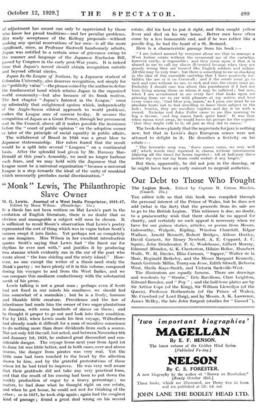"Monk" Lewis, The Philanthropic Slave Owner
M. G. Lewis. Journal of a West India Proprietor, 1815-17. Edited by Mona Wilson. (Routlodge. 15s.)
IF a thesis has not been written on Mat Lewis's part in the evolution of English literature, there is no doubt that so obvious and manageable a subject will soon be chosen. It is sufficient to recall Moore's observation that Lewis's poetry represented the sort of thing which was in vogue before Scott's success swept it into limbo. Yet perhaps not so completely as one imagines. Miss Wilson in her excellent introduction quotes Scott's saying that Lewis had " the finest ear for rhythm he ever met with," and justifies it by producing two stanzas which evidently ran in the ear of the poet who wrote about " the lone shieling and the misty island." . How- ever, no one except the writer of a thesis need study the Monk's poetry ; we have plenty of it in this volume, composed during his voyages to and from the West Indies, and we can compare this mediocre confectionery with the substantial merit of his prose.
Lewis talking is not a great man ; perhaps even if Scott had not fixed in our minds his smallness, we should feel him somewhat of a mannikin ; but he is a lively, humane and likeable little creature. Providence and the law of inheritance had made him the owner of two sugar plantations in Jamaica, with some hundreds of slaves on them ; and he thought it proper to go out and look into their condition. For by 1815, when Lewis made his first voyage, Wilberforce had already made it difficult for a man of sensitive conscience to do nothing more than draw dividends from such a source. Mat not only felt the call, but acted, and between November 8th and January 1st, 1816, he endured great discomfort and con- siderable danger. The voyage home next year from April 1st to June 1st was little better, and in both cases, over and above storms, the danger from pirates was very real. Yet the little man had. been touched to the heart by the affection shown to him, and by the grateful protestations of those whose lot he had tried to improve. He was very well aware that their gratitude did not take any very practical form, and that the result of his coming, had been to put down the weekly production of sugar by a heavy percentage ; no matter, he had done what he thought right on one estate, and when he got home, he could not rest for thinking of the other ; so in 1817, he took ship again ; again had the roughest kind of passage ; found a great deal wrong on his second
estate, did his best to put it right, and then caught yellow fever and died on his way home. Better men have often come by a less honourable end, and if he was rather like a poodle dog, he had the heart of a St. Bernard.
Here is a characteristic passage from his book :—
" I am indeed assured by everyone about mo that to manage a West Indian estate without the occasional use of the cartwhip, however rarely, is impossible ; and they insist upon it that it is absurd in me to call my slaves ill-treated because when they act grossly wrong they are treated like English soldiers and sailors. All this may be very true ; but there is something to me so shocking in the idea of this execrable eartwhip that I have positively for- bidden the use of it on Cornwall ; . and if the estate must go to rack and ruin without its use, to rack and ruin the estate must go. Probably I should care less about this punishment if I had not been living among those on whom it may be inflicted ; but now, when I am accustomed to see every face that looks upon mo grinning from ear to ear with pleasure at my notice, and hear every voice cry, ' God bless you, massa,' as I pass, one must be an absolute brute not to feel unwilling to leavo them subject to the lash ; besides, they are excellent cajolers and lay it on with a trowel. Nicholas and John Fuller came to me this morning to beg a favour, and bog massa hard, quite hard.' It was that when massa went away, ho would leave his picture for the negroos
that they might talk to it, all just as they did to massa.' "
The book shows plainly that the negro taste for jazz is nothing new, but that in Lewis's days European senses were not attuned to delight in it. He describes a festivity on his estate :—
" The favourite song was, Since massa come, we very well off which words they repeated in chorus without intermission (dancing all the time) for hours together ; till at half-past three neither my eyes nor my brain could endure it any longer."
But then, apparently, he did not join in the dancing, or he might have been an early convert to negroid aesthetics.








































 Previous page
Previous page